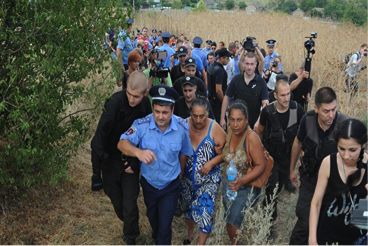
Minority Rights Group urges Ukraine to take swift, comprehensive action to end the growing culture of mob violence against the Roma
Last week another pogrom was attempted against the Roma in Andriivka village, Kharkiv Oblast, Ukraine. The incident followed a conflict between two sets of residents one of who was Roma. Despite recommendations from the local authority to establish a conflict resolution mechanism at a public meeting, the village took it on themselves to attempt forcibly evicting the Roma, with around 200 villagers descending on Roma houses.
Police intervened in time, dispersing the mob and arresting some perpetrators. Yet tensions and the threat of further conflict persists. This incident follows a pattern in recent years, where such protection was not as timely. The most notorious, the 2016 pogrom in Laschinovska village, following similar circumstances to Andriivka, led to Roma being forcibly evicted whilst police stood by. Despite international outcry the Roma of Laschinovska have been unable to return to their homes, many of which have been destroyed. Other incidents in Kiev and Kharkiv, which also involved collusion of public officials, also resulted in the expulsion of Roma communities. Little has been done to prosecute those responsible, increasing fear and mistrust of public officials in Roma communities.
‘The gross failure of Ukrainian authorities to thoroughly investigate and bring the perpetrators of anti-Roma violence to justice in recent years has led to a de facto culture of impunity across the country’, says Neil Clarke, MRG’s Head of Legal Programmes & Director of MRG’s Brussels office. ‘This culture of violence and intimidation has spread beyond far-right organizations and now involves members of the public, with some elected officials also taking part in group violence against Roma’.
In 2018 a series of violent attacks, stabbings, arson and assault by far right paramilitary groups, perpetrated over months against Roma communities, resulted in in charges against the perpetrators. These sustained attacks made police authorities engage with Roma CSOs to map the algorithms leading up to the attacks, which were fuelled by nationwide incidents of hate speech and dissemination of disinformation about the Roma.
‘Whilst in Andriivka police intervened to protect the community, the incident should have been prevented’ says Julian Kondur of Kondur of Roma Womens Fund Chiricli, a Romani-led NGO based in Kiev, who acted in support of the Roma in Andriivka.
MRG urges Ukraine authorities to investigate the Andriivka incident and to prosecute those responsible. The outstanding cases related to the Laschinovska pogrom and other incidents of anti-Roma violence also need urgent resolution. Ukraine authorities need to send a clear message against impunity for anti-Roma violence. Critically, authorities need to look deeper, at the underlying structural issues that marginalise Roma communities leading to a widespread culture of Anti-Gypsysim. The ongoing revision of Ukraine’s National Integration Strategy for Roma provides an ideal opportunity to acknowledge the existence and nature this anti-gypsyism and to develop clear programs to comprehensively address this marginalization in full cooperation with Roma leaders and CSOs.
Photo: The 2016 Laschinovska pogrom